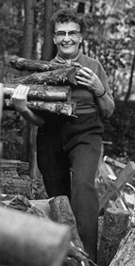
Alice Hanson Cook
November 28, 1903 - February 7, 1998
Professor Emerita Alice Hanson Cook died on February 7, 1998, just nine months short of her ninety-fifth birthday. Throughout her long and productive life, she dedicated herself to improving the lives of working women and men everywhere she went, not only at Cornell and across the United States, but around the world as well.
In her autobiography, A Lifetime of Labor (New York: The Feminist Press at the City University of New York, 1998), Alice refers to her "patchwork career": student, social worker, YWCA secretary, labor educator, post WWII advisor in Germany on reconstituting German labor unions, wife, mother, single parent of two boys and temporary parent to numerous others, professor, university ombudsman, world acclaimed researcher, and to the very end, an activist. What a remarkable example she set for living life to its fullest!
Labor education was Alice's first vocation, and dedication to the enlightenment of working adults continued to engage her energy and attention throughout her life. Upon graduation from Northwestern University where she had been a student activist, Alice wondered where she could find work, which would implement her social ideals. She found that spot in the YWCA Industrial Department, which provided education and support to blue collar women. A talented educator even in her twenties, she volunteered to teach in other pioneering workers' education movements of the time: Commonwealth College in Arkansas, Bryn Mawr Summer School in Pennsylvania, the Summer School for Workers in North Carolina. She applied her skills as an organizer and teacher while serving as Education Director for the Textile Workers Union and as Assistant to the President of the Amalgamated Clothing Workers Union Joint Board in Philadelphia.
Professor Cook had pursued graduate studies in Germany prior to the rise of Hitler, with special emphasis on the trade union movement there. Post-war, the U.S. Army turned to Alice for the task of reestablishing democratic unions in Germany through programs of adult education. Drawing on her prior knowledge of trade unions both in Germany and the U.S., and her fluency in the German language, Alice performed her assignment with distinction. Moreover, she developed contacts that became lifelong friends and sources of data for her later career as a scholar engaged in research and publication.
In 1952, Alice was recruited by ILR Extension to direct a foundation-funded project: Integrating of Unions and Community. The project brought Alice to Ithaca, where she remained for the rest of her life. M.P. Catherwood, then the Dean of the ILR School, recognized her brilliance, and persuaded her to teach Labor History and Union Administration courses in the resident degree program.
Moving into a new career as a college professor, Alice contributed both to teaching and research, publishing such path breaking works as Union Democracy: Practice and Ideal, Labor's Role in Community Affairs; and after winning a Fulbright for a year's study in Japan, An Introduction to Japanese Trade Unions, plus dozens of articles. Her research was almost always ahead of its time, and often cited.
As a teacher, Alice was both devoted and demanding. Her lectures were a pleasure to listen to, and easy to take notes from; each sentence was complete, it nested where it belonged in a paragraph, which in turn supported a section of her presentation. Not surprisingly, she graded student papers on both form and substance.
Alice Cook's service to Cornell and other parts of the local community was legendary. On campus, she was co-founder of the Women's Studies Program and the Advisory Committee on the Status of Women. And she opened the once all-male Faculty Club lunch hour to women. Appointed by University President Dale Corson as Cornell's first Ombudsman, she received complaints from anybody in the community, and she helped resolve them with patience and diplomacy. The procedures for that office are essentially the same now, as they were when Alice instituted them in 1970.
Nearly every women's group in the Ithaca area also benefited from Alice's wise counsel and generous support. Among them were the Ithaca branch of the American Association of University Women, the Professional Skills Roster, Displaced Homemakers, the Tompkins County Chapter of the National Organization for Women (NOW), and Planned Parenthood of Tompkins County.
Alice Cook retired from Cornell in 1973, but retirement, for her, merely meant going on to other pursuits. Her first undertaking was a study for the Ford Foundation of working women around the world, a global enlargement of the courses she had often taught for ILR Extension during her tenure. An explosion of publications followed that study, and included, The Working Mother, among others. In this period, she filed three amicus curae briefs, two in Japan on gender and age discrimination, and one in Canada on gender discrimination, as well as writing or co-authoring numerous articles.
In 1975, Alice and her collaborator received a German Marshall Fund grant to study women and trade unions around the world. Once again, she donned her seven-league boots, and the two-volume report which followed this exhaustive research, Women and Trade Unions in Eleven Industrialized Countries, made its appearance, along with Working Women in Japan: Discrimination, Resistance and Reform, and The Most Difficult Revolution: Women and Trade Unions, treasures all for anyone interested in comparative labor relations.
In 1983, which coincided with Alice's own 80th year, ILR celebrated her birthday by hosting an international conference on "Women Workers in Fifteen Countries" featuring speakers from the countries in which Alice had conducted her research. And in the years following, Alice Cook dedicated herself and her still remarkable energies to the study of comparable worth, and wrote two casebooks on the subject. Her research played an important role in public policy formulation and was the subject of a number of ILR Extension Conferences in which she was the lead speaker. Following the pattern of her youth, she continued to participate in summer schools for women workers as a teacher and speaker. And she found a winter home at the University of Hawaii's Industrial Relations Center, where, working at her computer, she turned out numerous articles, and finally many chapters in her autobiography.
Over the years, Alice Cook inspired and mentored thousands of students, trade unionists, and colleagues with her active mind, her interest in everything human, and her good and graceful spirit. She leaves a rich legacy for the next century.
Lois Gray, Francine Herman, Jennie Farley
Alice Cook Profiled In 1983 Ithaca Journal Article: ″Image 1 ″Image 2 ″Image 3

